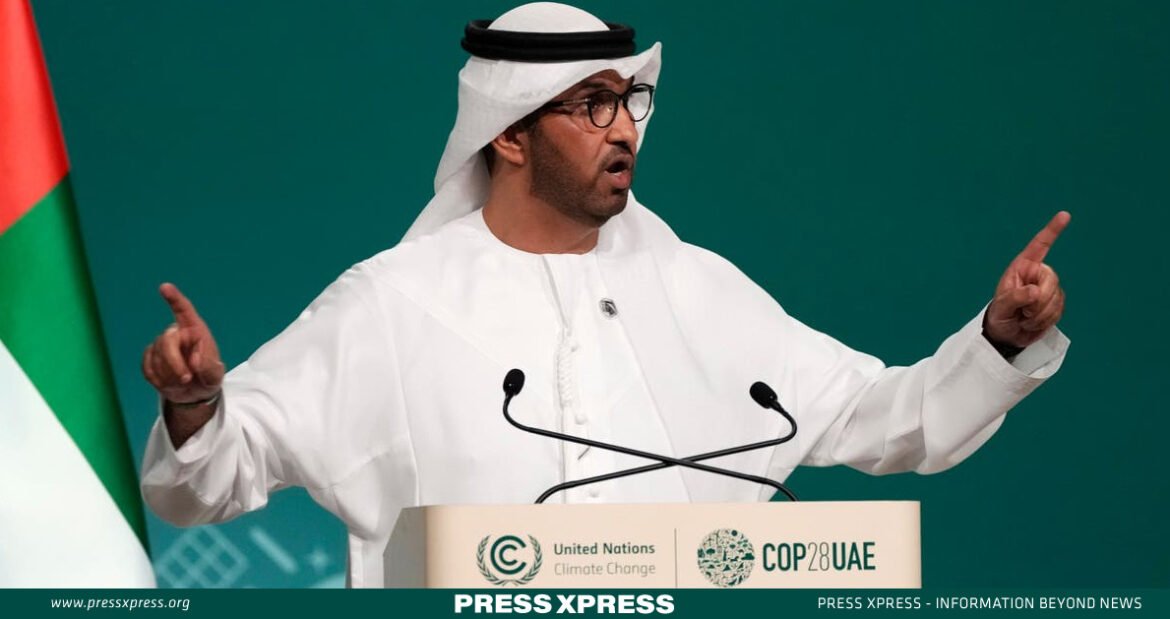The President of COP28 in the UAE, Sultan Al Jaber, challenged prevailing notions about fossil fuel phase-out during a spirited exchange with former Irish leader Mary Robinson. Al Jaber, also the head of the state oil giant ADNOC, emphasized that while there is no scientific evidence directly linking the elimination of fossil fuels to achieving global climate goals, he recognizes its inevitability.
You can also read: Sheikh Hasina Recognized as Asia Climate Mobility Champion at COP28
In a candid discussion at the SHE Changes Climate online conference on November 21, 2023, the 50-year-old climate envoy for the United Arab Emirates dismissed the idea of engaging in alarmist rhetoric. “I am factual, and I respect the science,” Al Jaber asserted, underlining the absence of any scientifically supported scenario advocating for a complete phase-out of fossil fuels to achieve the 1.5-degree Celsius target set in the landmark 2015 Paris climate conference.
Al Jaber’s ‘North Star’ Commitment to 1.5-Degree Goal
With the world falling significantly off-track in meeting this crucial target, Al Jaber reasserted his commitment to the 1.5-degree goal, describing it as his “North Star.” Despite acknowledging the inevitability of a phase-down and phase-out of fossil fuels, he urged a balanced, realistic, and pragmatic approach to the transition.
“We need to be real, serious, and pragmatic about it,” Al Jaber insisted during the forum on women leading climate action. He challenged skeptics to present a roadmap for a phased withdrawal from fossil fuels that facilitates sustainable socio-economic development, cautioning against regressing to an era reminiscent of caves.
In a captivating verbal exchange, Al Jaber injected a dose of reality into the discourse on climate action, emphasizing the need for a strategic and economically viable roadmap to guide the world toward a sustainable future while steering clear of hyperbolic and alarmist narratives.
The specification of a “phase-out” or a more lenient “phase-down” of fossil fuels emerges as a pivotal point of contention among negotiators at COP28 in Dubai. In their pursuit of a new global warming agreement, negotiators grapple with the complexities of this crucial decision.
Phasing Out Fossil Fuels ‘Inevitable’ for Achieving 1.5C
President Jaber, steadfast in his stance since June, reiterates the inevitability of phasing out hydrocarbons. However, he underscores the necessity for viable alternatives to be firmly in place before such a transition occurs. Additionally, he emphasizes the crucial role developed nations must play in leading this charge towards sustainable alternatives.
Responding to the recent report, a spokesperson for COP28 dismissed it as “just another attempt to undermine the presidency’s agenda.” The spokesperson defended the presidency’s transparency and highlighted tangible achievements, asserting that the COP president remains resolute in the belief that achieving the 1.5-degree Celsius target requires multifaceted action across various sectors.
Joeri Rogelj, a professor of climate science and policy at Imperial College London, weighed in, referencing last month’s UN IPCC climate change panel report that advocated for a phase-out. Rogelj recommended that President Jaber consult the latest IPCC report, unanimously approved by 195 countries, including the UAE. The report outlines diverse strategies to limit warming to 1.5C, all of which point toward a de facto phase-out of fossil fuels in the first half of the century.
Concerns Over Al Jaber’s Fossil Fuel Rhetoric
The 2015 Paris Agreement set the ambitious target of limiting the world’s average surface temperature to 1.5C above pre-industrial levels. With global temperatures already surging by more than 1.28C since 1880, achieving this limit is deemed crucial to averting the more perilous impacts of climate change, with emission reduction considered the most effective means to attain this goal.
UN Secretary-General Antonio Guterres’ underscored, “The 1.5C limit is only possible if we ultimately stop burning all fossil fuels. Not reduce. Not abate.” The juxtaposition of these statements highlights the ongoing debate and urgency surrounding the critical decisions required to address climate change effectively.
Scientists and advocacy groups expressed strong disapproval of Mr. al Jaber’s statements. Teresa Anderson of ActionAid International characterized his comments as “completely divorced from the reality of hundreds of millions of people on the frontline of climate catastrophe.” She emphasized that communities already grappling with the devastating effects of floods, droughts, and cyclones hold a starkly different perspective on whether a fossil-fuelled future signifies progress or poverty.
Anderson remarked, “With climate disasters worsening with each year, his comments fly in the face of all science and offer up another lifeline for climate-wrecking fossil fuel industries.”
Oil Industry Priorities?
Mohamed Adow, director of Power Shift Africa, echoed these sentiments, stating that Mr. al Jaber’s remarks reveal an entrenched stance in a fossil fuel fantasy that prioritizes the interests of the oil and gas industry.
“For the people in Africa already dying because of climate change, a fossil fuel phase-out date in the future is already too late. We need to ensure we have a date locked in here at COP28 so that at least the next generation has a chance to survive,” Adow emphasized.
Bill Hare, the chief executive of Climate Analytics, characterized the exchange as “extraordinary, revealing, worrying, and belligerent.” He pointed out that the notion of “sending us back to caves” echoes the oldest tropes of the fossil fuel industry and borders on climate denial.
Mr. al Jaber’s controversial statements add to the ongoing scrutiny of his suitability for the role, considering his position as the chief executive of the state-owned Abu Dhabi National Oil Company. Critics have questioned his background, and there are allegations that the UAE aimed to leverage the summit for new oil and gas deals, claims that Mr. al Jaber vehemently denied as “false.” The Dubai summit, underway since last week, is scheduled to continue until December 12, 2023.


